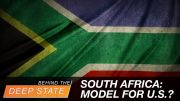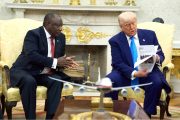A year after the execution of former Libyan despot Moammar Gadhafi at the hands of Western-backed rebels, forces opposed to the new Tripoli-based regime ruling parts of Libya are still fighting on. According to news reports, assorted Libyan militias supposedly aligned with the embattled new government have been shelling the Gadhafi-loyalist stronghold of Bani Walid all weekend in a bid to quash the late dictator’s remaining die-hard supporters.
Officials with the new government said the fighting reflected the fact that not all of Libya had been “liberated” yet. “The campaign to liberate the country has not been fully completed,” said Libyan “National Assembly” President Mohammed Megaryef, claiming a vast conspiracy among Gadhafi loyalists was afoot. “Bani Walid’s misfortune is that it has become a sanctuary for a large number of outlaws and anti-revolutionaries and mercenaries.”
According to Megaryef, who spoke about the conflict on national television Friday, part of the problem was the fact that the new government has not been able to rein in the various militia factions still in charge throughout most of Libya. It has also failed to build a credible police force or military of its own, relying instead on militias that were armed and trained by Western powers and assorted Arab dictatorships before and during the uprising that eventually ousted the Gadhafi regime from Tripoli.
“This lack of care has led to the spread of chaos that has lured the old regime to infiltrate the country’s institutions inside and to conspire with the regime loyalists on the outside,” Megaryef said, assuring Libyans that the fight was not against any particular tribe, region, or unarmed civilians. “And the chaos has lured others to kidnappings, stealing, and to create non-legitimate prisons. What has happened in Bani Walid in the last few days falls under this.”
Over two dozen pro-government militiamen have been killed and hundreds more wounded in the ongoing battles around Bani Walid so far, according to state news agencies, with the death toll continuing to rise as fighting intensified over the weekend. It was not immediately clear how many town residents or Gadhafi loyalists have died in the latest outbreak of the long-running conflict.
Clashes in and around the town have been going on sporadically for much of the last year, like in vast swaths of Libya. The latest round of battles in Bani Walid was reportedly sparked by rumors that Gadhafi loyalists who had killed a former rebel leader were being sheltered in the town and that locals refused to hand over those responsible.
Meanwhile, families were reported to be fleeing the city as the war rages on in and around the town of about 70,000 residents — one of the most loyal strongholds of the former Gadhafi regime about 100 miles outside of the capital. Pro-government militias set up checkpoints around the town to screen escaping residents and ensure that no Gadhafi loyalists managed to slip out.
“The attacks are continuing,” Bani Walid militia leader Abdelkarim Ghomaid told Reuters by phone, adding that his forces had already captured more than a dozen vehicles belonging to rival militias from the town of Misrata. “The shelling is coming from all sides.” Officials and witnesses on the ground claimed pro-government forces were bombarding the town indiscriminately and slaughtering civilians.
Militias from Misrata are reportedly doing most of the fighting in the latest bid to smash forces in Bani Walid opposed to the new NATO-backed government. That has human rights activists very worried — just last week, a new report documenting widespread war crimes including the mass execution of prisoners of war was released by the New York-based group Human Rights Watch. Rivalries between the two towns run deep, too.
However, the United Nations, which purported to authorize the “no-fly zone” unlawfully seized upon by President Obama and others to bring about “regime change” in Libya, released a statement siding with the new government amid the latest conflict. While purporting to call for peaceful solutions, the UN made it clear that the new regime in Tripoli would have international support in its campaign to quash the resistance.
According to Special Representative of the Secretary-General (SRSG) for Libya Tarek Mitri, who is also leading the UN Support Mission in Libya (UNSMIL), the new government has the “right” to “fully assert its national authority” over Bani Walid by deploying armed forces. “In the interests of national reconciliation and long-term stability of the country, a mediated settlement is urgently needed,” Mitri also said in a statement.
A spokesperson for UN Secretary-General Ban Ki-moon echoed concerns about the fighting and growing number of civilian casualties, but again claimed the actions of the new government were within bounds. “In their historic July elections, the Libyan people put their trust in the Libyan state, and the Secretary-General urges all Libyans to work together to strengthen the legitimacy and effectiveness of state institutions across the country,” the statement said, without, of course, mentioning the myriad problems with the voting, which took place amid widespread violence.
Even UN boss Ban Ki-moon eventually released a statement claiming that the new regime and militias aligned with it must be allowed to overrun the embattled town. “The Libyan authorities must be able to extend Libyan sovereignty and state control and services throughout the territory of Libya,” Ban said in the statement, again calling on citizens to help give the new regime power and legitimacy throughout the country. He also expressed concerns about the killing of civilians amid the siege.
Outraged about the ongoing assault on Bani Walid and concerned that the area would be destroyed like other towns loyal to Gadhafi, hundreds of protesters in Tripoli, many who said their families were still stuck in the hill-top city, converged on the Parliament building. They were met by armed men supposedly aligned with the new government who sprayed heavy-weapons fire over the crowd in a bid to get demonstrators to disperse. Some protesters were beaten by militiamen to stop them from speaking to journalists, the Associated Press reported.
In Benghazi, meanwhile, citizens stormed and destroyed a government-run media outlet for allegedly broadcasting lies about the chaos in Bani Walid. The protesters, mostly from the Warfalla tribe which remained largely loyal to Gadhafi throughout the Western-backed uprising, eventually torched offices and attacked journalists working for the new regime.
Amid the fighting in Bani Walid, confusion was running rampant about whether or not the former spokesman for the deposed Gadhafi regime, Moussa Ibrahim, had been arrested by the new authorities. The embattled government claimed he was in custody, but an audio recording purported to be Ibrahim insisted that the claims were false. “On the subject of my arrest today … it is an attempt to draw attention away from the crimes committed by NATO’s rebels against our people in Bani Walid,” the man identifying himself as Ibrahim said in the recording, the authenticity of which was supposedly in question.
While Obama and Western governments were quick to celebrate the killing of Gadhafi as heralding the “liberation” of Libya, the reality on the ground has obviously been far more complex. Since then, deadly clashes have claimed countless lives as heavily armed Islamist militants and assorted militia groups struggle for power.
In February, one of Gadhafi’s surviving sons promised that forces loyal to his father were plotting an imminent uprising to oust the Western-backed regime. Last month, meanwhile, a terror group reportedly led by a former U.S. government enemy-turned-ally-turned-enemy killed the American ambassador to Libya and several other U.S. personnel.
More recently, Syria has been on the receiving end of a similar Obama-backed campaign, with heavily armed jihadists financed by foreign governments seeking to overthrow secular despot Bashir al-Assad. Analysts expect that whether or not the Syrian “revolution” succeeds, the nation will likely end up looking a lot like Libya, or maybe even worse.
Related articles:
Report Exposes More War Crimes by Obama-backed Libyan Rebels
Gadhafi’s Son Warns of Imminent Uprising in Libya
Despite Violence, UN & Obama Hail Libya Election
Libyan Rebels Accused of “Ethnic Cleansing,” Black Genocide
NATO, Rebels Accused of War Crimes in Libya
Islamist Mobs Attack U.S. Missions in Libya and Egypt; Ambassador Dead
U.S. Officials Celebrate Killing of Former Ally Gadhafi
“Libyan Rebels” Create Central Bank, Oil Company
Photo: Libyan army vehicles drive up to the demonstration after firing their heavy machine guns to disperse the crowd of few hundred protesters from Bani Walid in front of parliament: AP Images




